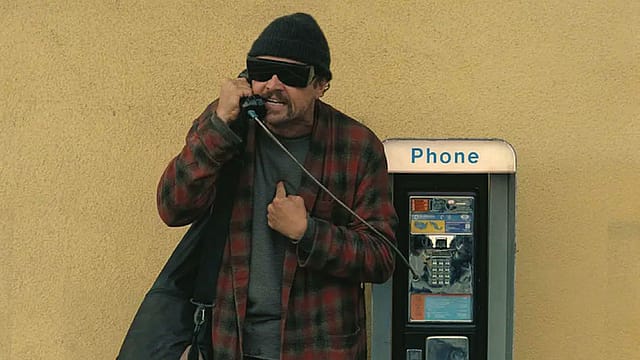An Ode to the Battle-Scarred

“THE WORLD IS WHAT IT IS; men who are nothing, who allow themselves to become nothing, have no place in it.” Only Naipaul could have said it with such brutal precision. One recurring image in Paul Thomas Anderson’s One Battle After Another is Bob Ferguson, a burned-out revolutionary on the run, played by Leonardo DiCaprio, desperately trying to contact his former comrades. But he can’t remember the password that will get him access. What time is it? He doesn’t know; a life in weed and alcohol has, by his own admission, fogged his brain. He doesn’t know what is there in the manual of the French 75, the radical leftist group that once stormed detention centres for migrants and robbed banks, and where he, as ‘Ghetto’ Pat, along with his romantic partner and leader Perfidia Beverly Hills (Teyana Taylor), was a less active member. Perfidia had left him, and now as a single father in search of his kidnapped teenage daughter Willa (Chase Infiniti), he, a middle-aged misfit in a plaid coat, is a hunted man, the past a terrifying presence in a world he can’t enter without a passcode: What time is it?
The world is what it is, but it is not his world, and as he stumbles along in this unlikely picaresque of the outcast, he realises that it is perhaps the only world he is entitled to. A world that prompts the viewers of Anderson, the one writer-director in Hollywood who is incapable of making a bad film, to dissect the frames of One Battle to see the traces of Trumpverse, complete with crypto-fascists and hunted progressives. Political is not an adjective usually added to the art of Anderson, though his mesmerising portrayal of the oil boom through the story of one man propelled by the idea of riches in There Will Be Blood remains a masterclass in submerging the political in the larger theatre of existential turbulence. The political in One Battle is an action drama with a high comedic quotient, and that it is told through someone as marooned as Bob is a reminder that freedom for the revolution’s lost remnant is a thriller with little cheer. It is always the yesterday, when the armed struggle was pure romance, literally in Bob’s world.
Openomics 2026: Continuity and Conviction
06 Feb 2026 - Vol 04 | Issue 57
The performance state at its peak
Say ‘illegal immigrants’ and you enter the argument that animates the politics on the Right today, and for those who are watching One Battle in an America where the ‘cattle flights’ are taking off at the command of the President of Greatness, where Charlie Kirk was killed for his opinion, and where a leftist television host was temporarily purged for his bad joke, the film may strike as intimately here and now. Anderson throws in a few cartoon characters to make the moral juxtaposition loud and clear. Bob’s nemesis is a priapic white supremacist who straddles the screen like a purposeful Terminator. The comic rage of Colonel Lockjaw (Sean Penn) easily echoes the ersatz Pure Americana of the MAGA times. That the cult to which the Colonel seeks admission is called the Christmas Adventurers Club, too, is very contemporary if you see its members steeped in white paranoia through the lens of racial exclusivism. As Anderson takes his battles to a rolling desert-road dénouement, the hunted and the hunter, however they share the bathetic exuberance of the present, are indebted to each other in their interpretation of justice. The road to validation, the colonel and the fugitive show in varying degrees of pathos and perversity, defies a moral straitjacket. Anderson’s avoidance of the pedagogical, despite our attempts to confine his work to the political templates of the moment, for the sake of the mystic ambiguities of art is what elevates One Battle to the epic level.
Anderson is inspired by Vineland, Thomas Pynchon’s raucous ode to the Sixties. In Pynchon’s novel, the unravelling of the revolutionary ideal is hastened by the mad swirl of the zeitgeist. The French 75 and the relationship between the single father and the teenage daughter may owe their genesis to the Pynchon novel, but One Battle is Anderson‘s riotously rhythmic meditation on the wages of rage, racial as well as emotional. Revolutions, as written across history’s abandoned pages, are manic and prosaic. The poetic comes on the day after, in all its redemptive poignancy. So does it in One Battle. To return to the question that puzzles Bob, What time is it?, the answer is Anytime. True to any work that soars through our battle-scarred conscience.
